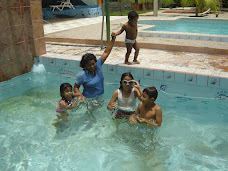This will be the last entry for a while as we are headed back to Alaska for a couple months. Not entirely by choice, but to replenish the coffers in order to spend most of late winter and spring back here, finishing the house and getting more established.
The last couple weeks have been primarily focused on getting the jeep in reliable running condition. This has required more patience than either of us would've expected, and just a bit more than we've had at times. The main issue, as succinctly put by Edwin the other night, after we returned from yet another mechanic with the requested work not actually done, is that there are relatively few professional mechanics here; what they all know how to do, however, is charge for their "services". So basically, any idiot with a wrench and a jack can hang out a shingle, lure in customers, take their money, and if the customer is lucky, the vehicle won't actually be in worse shape when returned. Because of this, we've tried to go on recommendations from people we trust, sticking to more reputable places, etc. But considering the results, I'm not sure it really mattered. Well, bit by bit things have eventually gotten repaired, and I don't think we've paid more than $100, parts & labor, anywhere—more often it's been closer to $25-$40—so there is a light at the end of the tunnel, if still not on the dashboard…
One day the latest set of men with wrenches called to tell us the jeep was ready, so we headed into town. At the shop, we discovered how relative a term "ready" can be, as most of the vital bits of the engine were still strewn about the pit. They assured us it really was 'almost' ready, so we pulled a couple of the ubiquitous plastic stacking chairs into the doorway facing the road and waited. I had my camera, and after watching the usual parade of forms of transportation pass by, decided to document the various options. In the picture section, you'll see: the cyclos. These are the three-wheel bikes with benches welded to the front that serve as cheap taxis for anywhere in and around Rivas. They are predominantly peddled by young men, although on occasion a gray head will appear. The rides cost anywhere from .42¢ to $1.80, depending on distance and number of passengers. You plop yourself onto the narrow padded bench, the driver secures the slim metal bar across your lap, much like an old amusement park ride, and you're off. I've only taken one once, with Reyna. At first I was sure we'd be launched into space every time he hit the brakes, or worse, a pothole, but somehow we arrived at our destination unscathed. Pat took one on his own last week, after we realized that by sitting on my cargo rack as I peddled us both home, he was not doing the bike any favors. We pulled over and he waved down a very skeptical looking older cyclo driver. After a brief negotiation {"How much to Buenos Aires?" (driver) "Too far." (driver's wife) "25 cords." (driver) "Really?" (wife) "Yes. OK, get in!"} Pat rode in self-conscious style the two miles home, and then gave the driver 40 (about $2), which I'm sure the wife never saw.
Then there are the horse drawn carts and carriages. The former for hauling stuff—anything from produce to building materials to live animals. The latter is limited to two-legged passengers, and is a cheaper alternative to a taxi, especially if there are more than three people. Allow yourself a bit more travel time, but this is more than compensated by that little "Al Gore would approve" glow resulting from not burning a single fossil fuel.
Mexico is not the only country south of the border to benefit from decommissioned US school busses. They are plentiful down here as well, often painted in bright colors and adorned with decals declaring the driver's association with Dios ("Blessed by God"; "God is my Driver"; "God is love", etc., although on one occasion I saw the same flowery metallic script weaving the word "Shrek" across a windshield…). The busses are often packed so tightly I wonder how anyone can actually get out at their stop, but they are reliable and cheap, especially for people commuting in from the countryside. These same open air busses run all the way to Managua and further, but I think that should we ever have the need to travel by bus, we'll splurge on one of the flashy modern air-conditioned alternatives…
Finally there are the bicycles themselves, on which it is not unusual to see an entire family of four—Papa peddling, Mama on the crossbar in front of him, the older child on the cargo rack, and the baby tightly held in Mama's free arm, bouncing on her thigh. I tried to get a picture of this, but was not successful. Same goes for the motorbikes, on which only the driver is required to wear a helmet. So you often see a man or woman zipping down the street, head well-protected, while the one, two, even three passengers cling to what they can as their hair whips in the wind unobstructed. Another favorite traffic law here concerns seatbelts: again, only the driver is required to wear one. You can have a dozen five year olds perched precariously on the roof of a pick up, or a dozen people standing in the truck bed, but if you pass a check point and the driver isn't buckled in, it's ticket time.
OK, enough about transportation. I think I wrote a while back about the cigars of Granada. Well Pat has become very fond of them, rationalizing his new habit by pointing out you don't inhale cigar smoke, rendering it less harmful to the body. No comment. But at least these fresh, organically grown, hand rolled models don't reek like most cheaper varieties found in the US. He has become a sort of ambassador of cigars (called "puros" here), always carrying a couple extra and handing them out whenever someone expresses interest or admiration. The fancy Granada ones ran out a while back, but he found a local alternative, grown, harvested, dried, and rolled by a handful of senior citizens who remember the old days and are now able to reap a modest profit from their skills. Very modest, as these rustic stogies run just over .5¢ a piece…they may not look like much (actually they look like very small brown boa constrictors who have just swallowed very small mice), but according to Pat, they are every bit as good as their elegant and symmetrical cousins from Granada.
Nov. 2nd was Dia de los Difuntos, or Day of the Dead. It’s not quite as big a deal as in Mexico, but from five in the morning the streets are crowded with flower vendors (many on bicycles), loudly touting their bright and beautiful wares. In the market itself, an entire section is given over to flowers, piles of purple, yellow, blue, red, spilling across the dusty pavers. I was waiting while I had some keys copied and observed the enthusiasm of both buyers and sellers. The whole scene was somehow reminiscent of the opening scene from “My Fair Lady”, minus the bulky clothing and the cockney accents. I biked past one of the larger cemeteries later and saw dozens of families cleaning and decorating the graves of their dead, many had radios playing lively music, and nearly everyone was dressed in vibrant colors. Children played between the plots, women chatted, and I am quite sure I spotted some men sipping from cans of beer. All in all, an inviting scene, and I was sorry I had no one to visit.
As for progress on the house, there's not been much. Edwin has just about completed all the electrical work, so at least that will be in place when we return. We are hoping to get our hands on some of that good tile then as well, assuming the factory reopens in January as scheduled, and by the time we return, it will be dry enough for us to dig the new well and get the septic system sorted. All of this should keep Pat busy, as I press ahead with my plans to open a small school. I have my eye on a building here in Buenos Aires, just need to find the dinero to make it mine and I'll be in business. I'm thinking of calling it "The English School". Not nearly as flashy as "The Abraham Lincoln Academy of English" or "The Freedom English School", already established by Nicas in Rivas, but hopefully, direct enough to draw in clients. I'll be sure and keep you posted as to my progress once we return.
Until then, thanks again for reading, stay tuned, and have a happy holiday season.
Friday, November 9, 2007
Wednesday, October 31, 2007
It has actually stopped raining, for the first time in over a week. Folks are saying this is the wettest October in a decade. This is apparently a pattern for us, as our first winter in Alaska was, according to just about everyone, the worst in a quarter of a century. And our first winter in Japan, also a record-breaker. We kind of like it this way, as it makes each successive, less extreme year seem mild and manageable. But in the mean time, we are growing a bit weary of being permanently damp. And of watching things mold before our very eyes. I looked up this morning while lying in bed and noticed the slender wooden slats that spread the top of the mosquito net were a lovely mottled shade of green….and Pat went to put on a brown leather belt he'd not worn for a week or two, only to find it now resembles green velvet. I even detected a spray of delicate greenish dots across one of my bras—one I wear and wash frequently. Yes, we are ready for the sun to return.
Much of our time recently has been spent on the quest for jeep parts. Although there are hundreds of these distinctive vehicles rumbling about the country, certain parts are not easy to come by, at least in our case, as it seems the engine is not the original but a replacement of an unspecified make. The mechanic is almost certain it came from a Toyota Land Cruiser pickup truck of roughly the same age, but this vague information was not helpful as we spent an entire day in Managua, running from shop to shop in search of specific bits and pieces. Just before dark, we managed to locate the correct leaf springs, and the suggestion that as the particular engine parts we were looking for may not actually exist, we could easily have them manufactured, and this is what we will do. We also swung by PriceSmart, the local Costco, for tires. Paid about what we would have at home, but figured it was worth it for the quality. Now everyone who sees the tires, neatly stacked over at Edwin's, comments on their beauty, and on our extravagance. Since writing the above, we have succeeded in finding an excellent local mechanic shop, with two very talented, and as far as we can tell, very honest mechanics. They will complete the rest of the work needed, then it's off to a body shop to sort out the doors and we should be good to go.
Last weekend we were invited to the ?th birthday party of a neighbor, China (pronounced 'chee-na'), the mother of Chino. I know she too has a real name, but she is China to all. We have been told she is 40, 42, even 45, but she claims 38, and who am I to argue? The party was held at their home, just down the road from Edwin's. Great quantities of food were served, and even greater quantities of alcohol consumed. The music was loud, and by 8pm, people were dancing beneath the fluorescent light in the tiny living room. At one point, the stereo was silenced so as to allow the dulcet strains of the Buenos Aires Marching Band to waft in from the front yard, where roughly 10 musicians of varying ages and genders stood to serenade China. In addition to the more traditional parade route fare, they pulled off a convincing rendition of a popular Cumbia tune, which had everyone bouncing around the yard, slipping in the mud and laughing at the persistent drizzle (which had little or no effect on the band.) The festivities lasted until well past 2am, when the rum ran out and the rain intensified.
We've had more blackouts of late than at any other time in our stay. Aside from the daily "planned" outages, from 8am-2pm, the heavy rains caused a nearby pole to topple and a transformer to explode, leaving around 100 homes powerless for over three days. Just as we were about to go out and buy a small generator and a large cooler, The Company got to us and restored our lights. Then just last night, as Pat and I sat watching a very disturbing documentary a friend lent us called "America: Freedom to Fascism" by Aaron Russo (I recommend it, but it's going to really make you angry), we heard a large truck rumbling down our road, followed by a loud thwump, and then a crack as the power line snapped and all went black. We ran outside to see the edge of the cable snagged on the top of the truck, which was now trying to back away, taking the line with it. I yelled at them to stop (no one had actually gotten out of the truck to see exactly what had happened), and no fewer than four guys leapt from the cab. When I pointed up to the line, they all started yelling, and one climbed up the side of the truck and kicked the line free. Another one said to me, Don't worry—it's nothing serious. I pointed to our house and said, But you've knocked out our power! Ah, he said, Well, have a good night. And off they went. We looked around, and realized ours was the only house in blackness, which seemed odd considering the precarious angle of the electric pole, now leaning out over the road by several feet, and the trails of very loose (but still attached) wires hanging less than ten feet above. Pat looked up to where the cables run into the house and saw that the negative had just snapped, leaving about two feet of empty space. So we trotted up the road to Edwin's and explained what had happened. He agreed to come down to see what he could do, and followed us with an assortment of cables and tools. Within five minutes of being up the ladder, twisting into place a spare piece of cable, he had restored our lights. We then tied colorful plastic bags on the lower-hanging cables, in hopes of warning future vehicles. The Company was notified, but it could be days before anything is done; that or another truck that this time takes out the entire block. (Update: about six days later, in the middle of an English class—around 7pm on a Friday—The Company deigned to return. They immediately cut off all power to the block, then stood the pole up straight and left again, without raising the cables still crossing the road at less than fifteen feet…)
The other night Pat, Edwin, & I embarked on a lengthy discussion of Nicaraguan politics. It began after Edwin told us the Mayor's office had asked him to assume the responsibilities of First Counsel to the mayor, as the man currently in that position will now be the vice-mayor because the vice-mayor must resign in order to run for mayor in next year's election. At first, Edwin wasn't too keen. In the first place, like most of Buenos Aires, he despises the current mayor. She is a conniving, two-faced, opportunistic thief—and those are some of the nicer things we've heard her called. So the idea of being linked to her administration did not sit well with him. But then he realized that if he took the job, he would be in a much stronger position to help us and the Scheers, another N. American couple with property on the lake, finally get the 99 year leases Ms. Mayor had been dangling in front of us all year. We told him that he absolutely should not do anything he didn't want to do solely on our account, which he appreciated, but after mulling it over for a couple weeks, decided to do anyway. Pat asked him if he himself had any mayoral aspirations; he said no. Pat said, But you'd be ideal. Edwin said, Well maybe, but he'd prefer to keep himself and his family unsullied by the inevitable corruption and filth that generally accompany government positions in Nicaragua. (And pretty much everywhere else.)
From there we went on to discuss how to fix Nicaragua, debating the pros and cons of 'top-down' vs. 'bottom-up' solutions, before finally concluding a bit of both was required, but first, corruption had to be brought under control, and how realistic was that?
Sunday morning at eleven, Pat and I found ourselves seated in a pew in the local Catholic Church, awaiting the commencement of the one-year anniversary mass for Edwin's mother, who passed away last year. There was an impressive turnout of over 200 people, including at least 35 immediate family members from assorted other cities. His mother was, by all accounts, a wonderful woman, much loved by family, friends, and community. The mass lasted just over an hour, although in the midday heat, it felt more like three. It was Pat's first mass in nearly twenty years; longer for me, going back to the few times in grade school I spent the night at a Catholic friend's house and accompanied the family to church. Back then, I found all the fancy language and constant motion—sitting, standing, kneeling—an entertaining novelty. Fortunately, any impending boredom was kept at bay by the antics of Linda, Edwin & Reyna's five-month old puppy, who had followed us in, and spent most of the mass wriggling about under our feet and gnawing on the base of the pews. No one seemed the least bit aggrieved by her presence, and when it was finally over, she was sound asleep under our feet, and I had to carry her out. Throughout the mass, my eyes kept landing on a vision in pink taffeta. A sort of brunette Barbie, sporting a flashy crown and holding a bouquet of plastic roses. Somehow, she seemed a bit out of place with the other nearly life-sized icons littered about: one, or possibly two St. Francis', each clutching a small child; a St. Joseph (remember—he's the patron saint of Buenos Aires); a very youthful Mary, and of course Jesus himself up above the altar. All of these rendered in plaster and faded paint, apparently perched on their pedestals since the church first opened its massive wooden doors. Finally I couldn't stand my ignorance another minute and leaned over to ask Edwin who this apparition might be. "La Virgen de Guadalupe," came the answer. Pat pointed out that she was generally several shades darker, and not often found in a prom dress, but the locals are very proud and protective of her, to the extent that she only gets hauled around town once a year, and only when it's sunny. Toward the end of the mass the "choir", which consisted of three members of the community singing to pre-recorded music, began what we quickly recognized as Simon & Garfunkel's "Sounds of Silence", except someone had changed not only the language, but all the words as well, so that now it was all about God and his benevolence, and nothing whatsoever about silence. Mercifully, the mass ended soon thereafter, and we were free to go back to Edwin's and make merry.
Today is Halloween, and it is raining again. We are better prepared this time around, having purchased bright yellow rain gear from the agricultural products store, but I expect it will be a sweaty experience bicycling about in a layer of rubber… If the local wags are correct, however, November should see the skies clearing and the temperatures dipping, and that is definitely something to look forward to.
Much of our time recently has been spent on the quest for jeep parts. Although there are hundreds of these distinctive vehicles rumbling about the country, certain parts are not easy to come by, at least in our case, as it seems the engine is not the original but a replacement of an unspecified make. The mechanic is almost certain it came from a Toyota Land Cruiser pickup truck of roughly the same age, but this vague information was not helpful as we spent an entire day in Managua, running from shop to shop in search of specific bits and pieces. Just before dark, we managed to locate the correct leaf springs, and the suggestion that as the particular engine parts we were looking for may not actually exist, we could easily have them manufactured, and this is what we will do. We also swung by PriceSmart, the local Costco, for tires. Paid about what we would have at home, but figured it was worth it for the quality. Now everyone who sees the tires, neatly stacked over at Edwin's, comments on their beauty, and on our extravagance. Since writing the above, we have succeeded in finding an excellent local mechanic shop, with two very talented, and as far as we can tell, very honest mechanics. They will complete the rest of the work needed, then it's off to a body shop to sort out the doors and we should be good to go.
Last weekend we were invited to the ?th birthday party of a neighbor, China (pronounced 'chee-na'), the mother of Chino. I know she too has a real name, but she is China to all. We have been told she is 40, 42, even 45, but she claims 38, and who am I to argue? The party was held at their home, just down the road from Edwin's. Great quantities of food were served, and even greater quantities of alcohol consumed. The music was loud, and by 8pm, people were dancing beneath the fluorescent light in the tiny living room. At one point, the stereo was silenced so as to allow the dulcet strains of the Buenos Aires Marching Band to waft in from the front yard, where roughly 10 musicians of varying ages and genders stood to serenade China. In addition to the more traditional parade route fare, they pulled off a convincing rendition of a popular Cumbia tune, which had everyone bouncing around the yard, slipping in the mud and laughing at the persistent drizzle (which had little or no effect on the band.) The festivities lasted until well past 2am, when the rum ran out and the rain intensified.
We've had more blackouts of late than at any other time in our stay. Aside from the daily "planned" outages, from 8am-2pm, the heavy rains caused a nearby pole to topple and a transformer to explode, leaving around 100 homes powerless for over three days. Just as we were about to go out and buy a small generator and a large cooler, The Company got to us and restored our lights. Then just last night, as Pat and I sat watching a very disturbing documentary a friend lent us called "America: Freedom to Fascism" by Aaron Russo (I recommend it, but it's going to really make you angry), we heard a large truck rumbling down our road, followed by a loud thwump, and then a crack as the power line snapped and all went black. We ran outside to see the edge of the cable snagged on the top of the truck, which was now trying to back away, taking the line with it. I yelled at them to stop (no one had actually gotten out of the truck to see exactly what had happened), and no fewer than four guys leapt from the cab. When I pointed up to the line, they all started yelling, and one climbed up the side of the truck and kicked the line free. Another one said to me, Don't worry—it's nothing serious. I pointed to our house and said, But you've knocked out our power! Ah, he said, Well, have a good night. And off they went. We looked around, and realized ours was the only house in blackness, which seemed odd considering the precarious angle of the electric pole, now leaning out over the road by several feet, and the trails of very loose (but still attached) wires hanging less than ten feet above. Pat looked up to where the cables run into the house and saw that the negative had just snapped, leaving about two feet of empty space. So we trotted up the road to Edwin's and explained what had happened. He agreed to come down to see what he could do, and followed us with an assortment of cables and tools. Within five minutes of being up the ladder, twisting into place a spare piece of cable, he had restored our lights. We then tied colorful plastic bags on the lower-hanging cables, in hopes of warning future vehicles. The Company was notified, but it could be days before anything is done; that or another truck that this time takes out the entire block. (Update: about six days later, in the middle of an English class—around 7pm on a Friday—The Company deigned to return. They immediately cut off all power to the block, then stood the pole up straight and left again, without raising the cables still crossing the road at less than fifteen feet…)
The other night Pat, Edwin, & I embarked on a lengthy discussion of Nicaraguan politics. It began after Edwin told us the Mayor's office had asked him to assume the responsibilities of First Counsel to the mayor, as the man currently in that position will now be the vice-mayor because the vice-mayor must resign in order to run for mayor in next year's election. At first, Edwin wasn't too keen. In the first place, like most of Buenos Aires, he despises the current mayor. She is a conniving, two-faced, opportunistic thief—and those are some of the nicer things we've heard her called. So the idea of being linked to her administration did not sit well with him. But then he realized that if he took the job, he would be in a much stronger position to help us and the Scheers, another N. American couple with property on the lake, finally get the 99 year leases Ms. Mayor had been dangling in front of us all year. We told him that he absolutely should not do anything he didn't want to do solely on our account, which he appreciated, but after mulling it over for a couple weeks, decided to do anyway. Pat asked him if he himself had any mayoral aspirations; he said no. Pat said, But you'd be ideal. Edwin said, Well maybe, but he'd prefer to keep himself and his family unsullied by the inevitable corruption and filth that generally accompany government positions in Nicaragua. (And pretty much everywhere else.)
From there we went on to discuss how to fix Nicaragua, debating the pros and cons of 'top-down' vs. 'bottom-up' solutions, before finally concluding a bit of both was required, but first, corruption had to be brought under control, and how realistic was that?
Sunday morning at eleven, Pat and I found ourselves seated in a pew in the local Catholic Church, awaiting the commencement of the one-year anniversary mass for Edwin's mother, who passed away last year. There was an impressive turnout of over 200 people, including at least 35 immediate family members from assorted other cities. His mother was, by all accounts, a wonderful woman, much loved by family, friends, and community. The mass lasted just over an hour, although in the midday heat, it felt more like three. It was Pat's first mass in nearly twenty years; longer for me, going back to the few times in grade school I spent the night at a Catholic friend's house and accompanied the family to church. Back then, I found all the fancy language and constant motion—sitting, standing, kneeling—an entertaining novelty. Fortunately, any impending boredom was kept at bay by the antics of Linda, Edwin & Reyna's five-month old puppy, who had followed us in, and spent most of the mass wriggling about under our feet and gnawing on the base of the pews. No one seemed the least bit aggrieved by her presence, and when it was finally over, she was sound asleep under our feet, and I had to carry her out. Throughout the mass, my eyes kept landing on a vision in pink taffeta. A sort of brunette Barbie, sporting a flashy crown and holding a bouquet of plastic roses. Somehow, she seemed a bit out of place with the other nearly life-sized icons littered about: one, or possibly two St. Francis', each clutching a small child; a St. Joseph (remember—he's the patron saint of Buenos Aires); a very youthful Mary, and of course Jesus himself up above the altar. All of these rendered in plaster and faded paint, apparently perched on their pedestals since the church first opened its massive wooden doors. Finally I couldn't stand my ignorance another minute and leaned over to ask Edwin who this apparition might be. "La Virgen de Guadalupe," came the answer. Pat pointed out that she was generally several shades darker, and not often found in a prom dress, but the locals are very proud and protective of her, to the extent that she only gets hauled around town once a year, and only when it's sunny. Toward the end of the mass the "choir", which consisted of three members of the community singing to pre-recorded music, began what we quickly recognized as Simon & Garfunkel's "Sounds of Silence", except someone had changed not only the language, but all the words as well, so that now it was all about God and his benevolence, and nothing whatsoever about silence. Mercifully, the mass ended soon thereafter, and we were free to go back to Edwin's and make merry.
Today is Halloween, and it is raining again. We are better prepared this time around, having purchased bright yellow rain gear from the agricultural products store, but I expect it will be a sweaty experience bicycling about in a layer of rubber… If the local wags are correct, however, November should see the skies clearing and the temperatures dipping, and that is definitely something to look forward to.
Thursday, October 11, 2007
Oct. 8, 2007
It occurs to me that some of you reading this were not yet born when our new vehicle rolled off the assembly line back in 1978. Not exactly a spring chicken (and there will be more about chickens later), but a Land Cruiser jeep, and therefore not subject to the usual criteria by which we measure the life of an automobile. It is a diesel, which is a blessing in this land where gas prices routinely top $4.50 a gallon, and it is white, which helps deflect some of the intense midday sun. An inspection prior to purchase by a reputable mechanic (in no way affiliated with the owners, who live in Managua, and under the impression the jeep was for Edwin) informed us that it is in excellent condition, requiring perhaps $500 in mechanical repairs and assorted electrical and body improvements. Throw in a new set of tires, and we will be ready to explore the furthest, most inaccessible reaches of Nicaragua, unencumbered by tedious concerns of getting stuck in sand or mud, or appearing too conspicuous on the streets of Managua. We are thinking of calling it "Sandino", after the hero of the first anti-American revolution back in the 20's, whose name became the basis for the more recent Sandinista movement. (Although after Ortega's recent speech, in which he chose to use the dais to rail against US imperialism rather than to rally financial and volunteer support for the thousands of victims of hurricane Felix, Sandinistas are not ranking very high here at the moment…)
As for chickens, I had a very close encounter with one the other night, in a sort of Fellini-meets-Lynchian scene at Edwin's bar. Pat and I had been visiting friends outside of Rivas and stayed later than we'd expected. Too tired to start cooking, and hoping to beat the imminent arrival of the rains, we peddled maniacally back to Buenos Aires, arriving at Edwin's just as the skies opened and another deluge began. It being Thursday, the place was pretty quiet; just Chino, a neighbor, who'd been drinking since 3:00 (it was around 8:30), and two very drunk cousins, slender young men who could've easily passed for twins. Chino, who's around 20, spends much of his time and his paycheck (he's an electrical-mechanic-in-training)at Edwin's, and when he's had a few, likes to go on about the importance of friendship. We are fond of him—he has a certain incorrigible puppiness about him—but he is a bit of a conniver as well, illustrated by the time Pat chainsawed up some wood for one of Edwin's cousins, gratis, after which Chino (whose real name, curiously, is Yasser, but is called Chino because his eyes are a bit squinty. The whole concept of "P.C." hasn't really caught on here yet) went to the guy and said he had to pay around $3 for the gas Pat used, and promptly pocketed the money. Fortunately Reyna somehow found out about it, made him return the money, and assured the cousin Pat had nothing to do with any of it. On this particular night, however, he wanted to show us his devotion and so when one of the inebriated twins staggered over and began boasting about this beautiful little hen he had at home, an actual chicken, Chino offered to buy it for us. The price of a young chicken is, coincidently, equivalent to the cost of a liter of beer, so William, the braggart, was more than happy to make the deal, and wobbled off to fetch the chicken. (Pat, who after being told the topic of conversation, had lost interest, asked as he left, "Where's he off to then?" "I believe he's gone to get the chicken." which made him laugh until he realized I was serious.) About ten minutes later, William returned with a smallish chicken under his arm, her legs tied securely together, and resumed extolling her charms. He then thrust her at me, squawking loudly and flapping her wings, clearly discontented with the way her evening was going. I settled her on my lap and began stroking her feathers, and surprisingly, she calmed down. Meanwhile Chepe, William's only slightly less drunken cousin (and not the same Chepe from the fishing excursion last winter), had played a Guns and Roses song on the jukebox, which is always at top volume, and was reeling around happily, making the "cool surfer" gesture with his hands (variously thumb, index, and pinky extended, or just thumb and pinky) in everyone's face. This behavior seemed to upset the chicken (whom Reyna suggested we name Chepita, but whom we later dubbed "Lulu"), and she began squawking agressively. The song eventually ended, Lulu was becalmed, and conversation resumed, centering on William's claim that she only needed a rooster to produce generations of gorgeous, salable chickens. I said, If she's to be my chicken, she will never 'know' a rooster. She will remain chaste, virginal, and pure. Reyna told me it was already too late; my chicken was no virgin, and laughed at my horrified expression and murmurs of rape. William plucked her from my lap and began cooing to her, nuzzling and kissing her with a disturbing intimacy, though Lulu herself seemed decidedly unimpressed. Chino grabbed her and stuffed her back onto my lap, declaring the deal made, and the chicken mine. I turned to Reyna and asked if she wanted a chicken. She said sure, she would need a few for Milagro's birthday party in December. I asked the chicken if she wanted to live for a couple more months, and then give her life for a three year old. She pecked at a freckle on my knee and went to sleep. I promised to visit her regularly, and then handed her over to Reyna, who plopped her in the hammock while she attended to other business. Chino, by now at one with his cerveza, gave me his blessing.
Sunday was yet another Saint's Day, beginning as always with "bombas" (firecrackers)at six am. I think I wrote about these manifestations of evil in the first blog, and now, months later, I cannot in good faith say I have grown any fonder of the heart-stopping blasts. The particular saint being touted this time was St. Francis, or San Francisco to the locals. For reasons not yet entirely clear, his day is celebrated, at least here in Buenos Aires, by a parade of Diablos y Caballos, or Devils and Horses. There were by my count something like 30 Diablos and exactly one rather pallid Caballo, a fairly blatant representation of our neighbors' tendencies. The Diablos wore bright orange, red, and yellow costumes and had scary masks, most of which were carved locally, but at least one guy had on a sort of clown suit, multi-colored wig, and one of those Scary Movie type masks. I think the real Diablos were laughing at him because he kind of skipped along the parade route separate from the pack. There was also the ring leader, or main devil, who carried a trident and herded both Diablos and townspeople through the crowded streets. Children ran around shouting and from time to time some of the Diablos would chase them, sending them shrieking ahead. In the midst of all the chaos came four men carrying a statue of St. Francis on a litter. Francis appeared a bit mystified by all those Diablos, but I like to think the sight of the Caballo calmed him, compensating a bit for the absence of any other fauna. The parade passed by the house around nine am, and was gone in less than five minutes, leaving behind a few shreds of yellow and red paper, and the pungent aroma of recent bomba activity.
October is the final month of the rainy season, and also the wettest. Aside from saturating the fields and filling the reservoirs, a less heralded benefit is the profusion of fireflies that litter the sky nightly. We have biked the three miles home from Rivas several times after dark recently, in spite of Reyna's repeated warnings that the ladrones (thieves) are just biding their time, in order to experience the magic of peddling through these living meteorite showers. The tiny sparklers are smaller than their US counterparts, but what they lack in size, they more than compensate for in glow-time. We usually have a few in the bedroom as well, flitting about outside the mosquito net, keeping us entertained until sleep comes. I don't know how long into the dry season they will last, but suspect that any attempt to bottle them against future shortages would not be an effective solution. Best to just enjoy them now, much like the Japanese drop everything for a week in the spring to sit under the cherry blossoms, eat fried octopus, drink obscene quantities of beer, and sing depressing songs about lost love and the trials of being a rice farmer. Oh, the fireflies have their own musical accompaniment as well, in the form of some bizarre species of frog whose croak sounds like the noises emitted from a video arcade. Entire fields resonate with this electronic pinging, reverberating across the roads and filling the air with cheerful techno-zings. (I should find a way to record it and send it into NPR for that bit they do with people's sounds…)
The sounds of technology are not limited to the fields, however. A number of enterprising locals have opened places where kids can come in and play Nintendo, or Play Station, or Wii, or whatever the latest craze is. Rooms measuring no more than three or four hundred square feet manage to pack in up to ten TV's, with three or four kids grouped around each, waggling their wee joysticks to make soccer goals or complete a Nascar course or whack the head off some evil creature. We have been trying our luck renting DVD's again, and have been reasonably successful at one place that doubles as one of these arcades. We tend to choose our films very quickly, if only to escape the heat and the deafening noise ten different games all at full volume can produce. Nevertheless, it's entertaining to watch it all, for three or four minutes. (Update: as of yesterday, they no longer rent movies, only sell them. We are now the proud owners of a $1 bootleg version of "Beatrix Potter".)
Finally, we thoroughly cleaned out the house. Amazing, in just three and a half months of standing vacant, it had been colonized by every indigenous creature, including these nasty giant black centipedes, up to six inches long, and packing a nasty sting; scorpions, not the deadly black variety found to the north, but a sort of grayish translucent type, whose sting resembles that of a particularly virulent bee, followed by hours of numbness at the point of contact (both of these the kids and I killed without remorse--Buddhist tendencies be damned); and the prize, a tarantula easily measuring the span of my hand, but who was so gentle and beautiful, I ignored the kids' pleas for execution and trapped it in a box, carried it to the neighbor's fence, and liberated it. This made Pat very happy, and no doubt proved satisfactory to the spider as well. We'll need to repaint at some point, to mask the damage doen by all the wasps' nests, but at least the place is clean and ready for us to get back to work, more or less unmolested by our six and eight-legged neighbors.
It occurs to me that some of you reading this were not yet born when our new vehicle rolled off the assembly line back in 1978. Not exactly a spring chicken (and there will be more about chickens later), but a Land Cruiser jeep, and therefore not subject to the usual criteria by which we measure the life of an automobile. It is a diesel, which is a blessing in this land where gas prices routinely top $4.50 a gallon, and it is white, which helps deflect some of the intense midday sun. An inspection prior to purchase by a reputable mechanic (in no way affiliated with the owners, who live in Managua, and under the impression the jeep was for Edwin) informed us that it is in excellent condition, requiring perhaps $500 in mechanical repairs and assorted electrical and body improvements. Throw in a new set of tires, and we will be ready to explore the furthest, most inaccessible reaches of Nicaragua, unencumbered by tedious concerns of getting stuck in sand or mud, or appearing too conspicuous on the streets of Managua. We are thinking of calling it "Sandino", after the hero of the first anti-American revolution back in the 20's, whose name became the basis for the more recent Sandinista movement. (Although after Ortega's recent speech, in which he chose to use the dais to rail against US imperialism rather than to rally financial and volunteer support for the thousands of victims of hurricane Felix, Sandinistas are not ranking very high here at the moment…)
As for chickens, I had a very close encounter with one the other night, in a sort of Fellini-meets-Lynchian scene at Edwin's bar. Pat and I had been visiting friends outside of Rivas and stayed later than we'd expected. Too tired to start cooking, and hoping to beat the imminent arrival of the rains, we peddled maniacally back to Buenos Aires, arriving at Edwin's just as the skies opened and another deluge began. It being Thursday, the place was pretty quiet; just Chino, a neighbor, who'd been drinking since 3:00 (it was around 8:30), and two very drunk cousins, slender young men who could've easily passed for twins. Chino, who's around 20, spends much of his time and his paycheck (he's an electrical-mechanic-in-training)at Edwin's, and when he's had a few, likes to go on about the importance of friendship. We are fond of him—he has a certain incorrigible puppiness about him—but he is a bit of a conniver as well, illustrated by the time Pat chainsawed up some wood for one of Edwin's cousins, gratis, after which Chino (whose real name, curiously, is Yasser, but is called Chino because his eyes are a bit squinty. The whole concept of "P.C." hasn't really caught on here yet) went to the guy and said he had to pay around $3 for the gas Pat used, and promptly pocketed the money. Fortunately Reyna somehow found out about it, made him return the money, and assured the cousin Pat had nothing to do with any of it. On this particular night, however, he wanted to show us his devotion and so when one of the inebriated twins staggered over and began boasting about this beautiful little hen he had at home, an actual chicken, Chino offered to buy it for us. The price of a young chicken is, coincidently, equivalent to the cost of a liter of beer, so William, the braggart, was more than happy to make the deal, and wobbled off to fetch the chicken. (Pat, who after being told the topic of conversation, had lost interest, asked as he left, "Where's he off to then?" "I believe he's gone to get the chicken." which made him laugh until he realized I was serious.) About ten minutes later, William returned with a smallish chicken under his arm, her legs tied securely together, and resumed extolling her charms. He then thrust her at me, squawking loudly and flapping her wings, clearly discontented with the way her evening was going. I settled her on my lap and began stroking her feathers, and surprisingly, she calmed down. Meanwhile Chepe, William's only slightly less drunken cousin (and not the same Chepe from the fishing excursion last winter), had played a Guns and Roses song on the jukebox, which is always at top volume, and was reeling around happily, making the "cool surfer" gesture with his hands (variously thumb, index, and pinky extended, or just thumb and pinky) in everyone's face. This behavior seemed to upset the chicken (whom Reyna suggested we name Chepita, but whom we later dubbed "Lulu"), and she began squawking agressively. The song eventually ended, Lulu was becalmed, and conversation resumed, centering on William's claim that she only needed a rooster to produce generations of gorgeous, salable chickens. I said, If she's to be my chicken, she will never 'know' a rooster. She will remain chaste, virginal, and pure. Reyna told me it was already too late; my chicken was no virgin, and laughed at my horrified expression and murmurs of rape. William plucked her from my lap and began cooing to her, nuzzling and kissing her with a disturbing intimacy, though Lulu herself seemed decidedly unimpressed. Chino grabbed her and stuffed her back onto my lap, declaring the deal made, and the chicken mine. I turned to Reyna and asked if she wanted a chicken. She said sure, she would need a few for Milagro's birthday party in December. I asked the chicken if she wanted to live for a couple more months, and then give her life for a three year old. She pecked at a freckle on my knee and went to sleep. I promised to visit her regularly, and then handed her over to Reyna, who plopped her in the hammock while she attended to other business. Chino, by now at one with his cerveza, gave me his blessing.
Sunday was yet another Saint's Day, beginning as always with "bombas" (firecrackers)at six am. I think I wrote about these manifestations of evil in the first blog, and now, months later, I cannot in good faith say I have grown any fonder of the heart-stopping blasts. The particular saint being touted this time was St. Francis, or San Francisco to the locals. For reasons not yet entirely clear, his day is celebrated, at least here in Buenos Aires, by a parade of Diablos y Caballos, or Devils and Horses. There were by my count something like 30 Diablos and exactly one rather pallid Caballo, a fairly blatant representation of our neighbors' tendencies. The Diablos wore bright orange, red, and yellow costumes and had scary masks, most of which were carved locally, but at least one guy had on a sort of clown suit, multi-colored wig, and one of those Scary Movie type masks. I think the real Diablos were laughing at him because he kind of skipped along the parade route separate from the pack. There was also the ring leader, or main devil, who carried a trident and herded both Diablos and townspeople through the crowded streets. Children ran around shouting and from time to time some of the Diablos would chase them, sending them shrieking ahead. In the midst of all the chaos came four men carrying a statue of St. Francis on a litter. Francis appeared a bit mystified by all those Diablos, but I like to think the sight of the Caballo calmed him, compensating a bit for the absence of any other fauna. The parade passed by the house around nine am, and was gone in less than five minutes, leaving behind a few shreds of yellow and red paper, and the pungent aroma of recent bomba activity.
October is the final month of the rainy season, and also the wettest. Aside from saturating the fields and filling the reservoirs, a less heralded benefit is the profusion of fireflies that litter the sky nightly. We have biked the three miles home from Rivas several times after dark recently, in spite of Reyna's repeated warnings that the ladrones (thieves) are just biding their time, in order to experience the magic of peddling through these living meteorite showers. The tiny sparklers are smaller than their US counterparts, but what they lack in size, they more than compensate for in glow-time. We usually have a few in the bedroom as well, flitting about outside the mosquito net, keeping us entertained until sleep comes. I don't know how long into the dry season they will last, but suspect that any attempt to bottle them against future shortages would not be an effective solution. Best to just enjoy them now, much like the Japanese drop everything for a week in the spring to sit under the cherry blossoms, eat fried octopus, drink obscene quantities of beer, and sing depressing songs about lost love and the trials of being a rice farmer. Oh, the fireflies have their own musical accompaniment as well, in the form of some bizarre species of frog whose croak sounds like the noises emitted from a video arcade. Entire fields resonate with this electronic pinging, reverberating across the roads and filling the air with cheerful techno-zings. (I should find a way to record it and send it into NPR for that bit they do with people's sounds…)
The sounds of technology are not limited to the fields, however. A number of enterprising locals have opened places where kids can come in and play Nintendo, or Play Station, or Wii, or whatever the latest craze is. Rooms measuring no more than three or four hundred square feet manage to pack in up to ten TV's, with three or four kids grouped around each, waggling their wee joysticks to make soccer goals or complete a Nascar course or whack the head off some evil creature. We have been trying our luck renting DVD's again, and have been reasonably successful at one place that doubles as one of these arcades. We tend to choose our films very quickly, if only to escape the heat and the deafening noise ten different games all at full volume can produce. Nevertheless, it's entertaining to watch it all, for three or four minutes. (Update: as of yesterday, they no longer rent movies, only sell them. We are now the proud owners of a $1 bootleg version of "Beatrix Potter".)
Finally, we thoroughly cleaned out the house. Amazing, in just three and a half months of standing vacant, it had been colonized by every indigenous creature, including these nasty giant black centipedes, up to six inches long, and packing a nasty sting; scorpions, not the deadly black variety found to the north, but a sort of grayish translucent type, whose sting resembles that of a particularly virulent bee, followed by hours of numbness at the point of contact (both of these the kids and I killed without remorse--Buddhist tendencies be damned); and the prize, a tarantula easily measuring the span of my hand, but who was so gentle and beautiful, I ignored the kids' pleas for execution and trapped it in a box, carried it to the neighbor's fence, and liberated it. This made Pat very happy, and no doubt proved satisfactory to the spider as well. We'll need to repaint at some point, to mask the damage doen by all the wasps' nests, but at least the place is clean and ready for us to get back to work, more or less unmolested by our six and eight-legged neighbors.
Monday, October 1, 2007
19 days after our return and I think we can finally settle back into our former routine of early nights, early mornings, working on the house, studying Spanish, hanging out at Edwin's, balancing the work and the relaxation. Up until now, however, we've spent as much time away from Buenos Aires as in it. This is in part due to Grant and Linda's presence, and joining them on their explorations of the area. We spent a couple days up in Granada, the highlight of which was a visit to a small family run cigar factory where several people sat at ancient wooden benches hand rolling leaves grown from pure Cuban seed into tight, beautiful, aromatic stogies any aficionado would relish. Pat and Grant have decided to tell their buddies back home that the cigars were in fact rolled on the thighs of beautiful young women, but I'm afraid the pictures won't support this fantasy… Later that same afternoon we fled from a torrential downpour rivaling anything I ever saw in Thailand, and found refuge under the substantial balconies of a colonial beauty dating back to the mid 1800's. The owners had thoughtfully set out tables and chairs and even went so far as to serve us icy beers for a nominal fee. Another refugee of the rains stopped by our table, a middle-aged black man called John Oliver originally from one of the islands off the Atlantic coast, not far from Bluefields. He was now supporting himself in Granada as an artist and street musician, apparently the only one of his kind. He knew Managua well, including the bar where Pat, Edwin, and I had spent that infamous last evening before heading back to Alaska. "Dat's a bad area, Mon—whacha doin' over dere?" Which of course served to prove Reinaldo and Rosario right about their neighborhood after dark, much to our dismay. He then produced a painting he'd just completed—literally—the paint was still glistening—of a serene "Costeño" beach scene, and which we bought for around $7.00. He threw in a bottle of clear nail varnish and instructed us on its application once the picture had dried, wished us a pleasant stay, and bobbed off into the rain.
We dined that night at a renowned steak house, feasting on obscenely succulent hunks of grilled flesh, cooked to perfection and so tender the knives were almost superfluous. With drinks and a coconut flan I would willingly sell Patrick for, the tab came to $15 apiece—at least nearly four times the usual--but worth every peso.
Soon after our return to Buenos Aires we headed off again, this time back to Ometepe Island, to the sector we hadn't explored last winter on our bikes, and where Grant and Linda had recently completed the tedious process of purchasing land. Their lots, both right on the lake, about half a mile from one another, have great potential and a lot of hard work ahead. We stayed the second night at a fairly new place called El Encanto, run by an Australian woman and her El Salvadoran husband. It was absolutely lovely. Perched atop a hill, overlooking the lake, part of the volcano, and gorgeous gardens swarming with butterflies. We dined on curry and ice-cream smothered in passion fruit from the orchard, and fell asleep to the sound of rain and relentlessly energetic frogs.
On the way to visiting Grant & Linda's property, we encountered a herd of cattle taking the sun in the middle of the road. With no cowboys in sight and one particularly inconveniently placed bull in our path, Pat jumped out to have a chat with the large beastie. When that had no effect, he tried a gentle prod, followed by a not-so-gentle prod, and as a last resort, booted the bull in the ass. Nothing. We eventually managed to maneuver the car around the stubborn creature—coming and going.
A day after returning from the island, we took a road trip out to the little town of Cardenas, about 26 miles from Rivas on a newly paved (or cobbled) road, on the strip of land that winds between Costa Rica and Lake Nicaragua at the SW border. A Canadian couple we know has property out that way, and Grant & Linda were curious to see it. We had lunch at a beachfront restaurant and enjoyed some of the best chicken we've eaten to date—in a country where many establishments offer you a choice of chicken, chicken, or chicken, that's no mean compliment. After lunch, we wandered down to the beach, curious about a small ferry that had pulled up, dropped anchor, and begun unloading a series of very large pigs. The swine were tied up and allowed to frolic about in the water while the rest of the freight, consisting mainly of plantains, was transferred to a waiting bus. (Like the majority of busses down here, it was an old US school bus, repainted and serving Nicaragua well. Most of these bussed still use the flashing red lights when they are stopping, but there are no laws for drivers to give way. I wondered the other day how many US citizens down here have caused accidents by reflexively jamming on their brakes when they see those lights…) The ferry, a small one, runs up and down the coast, from Sapoá, 15 miles south of Rivas, to Colón, the last town before Costa Rica. It carries passengers and freight, and is cheaper than the somewhat unreliable bus. We were about to leave when a group of men showed up and lead one of the pigs toward the bus. They tied a second cord around its belly, and began hoisting the now very unhappy pig up onto the top of the bus. They proceeded to repeat this process with all four pigs, each one squealing louder than the last, and clearly not enjoying themselves nearly as much as the men, several of whom were amused to have this event documented by a Gringa. In the end, the largest pig refused to lie down, and had to be secured to the railing standing up, but with a distinctly smug look on its face.
Our final trip took us to Matagalpa, one of the departments toward the north, and location of San Ysidro, Reyna's hometown. She invited us to accompany the family on their bi-annual visit, and we eagerly accepted. Our only provision: allow us to rent a minivan because the idea of six adults, two kids, a couple hundred pounds of plantains, and a surprisingly large amount of baggage strained the limits of Edwin's wee pickup—not to mention the likelihood of encountering severe downpours enroute. They thought we were nuts, but humored us, and so after two damp, cramped, sweaty hours up to Managua, we made the exchange for a Suzuki 8-seater with AC. Pat drove, Edwin navigated, and everyone else was much more comfortable—damn pampered Gringos…
Although only about five hours north of Rivas, the landscape is very different. Mountainous, in some areas forested, others wide open for cattle. It was noticeably cooler as we climbed, a welcome respite from the cauldron of Managua. The last five or six miles into Reyna’s small neighborhood was on a road so pocked with holes it was like driving across a cheese grater. Vehicles were swerving from one side to the other, desperate to decrease full-on contact with these craters, narrowly avoiding the ubiquitous cyclists, meandering cows, frolicking horses, scavenging dogs, and the strategic checkpoints set up by the kids every mile or so, bits of string knotted together and strung across the road, just where the potholes seem insurmountable, and pulled up as cars approached. Accompanied by cries of "Un peso!", they tend not to drop the string until the very last minute, resulting an a lot of snapped strings and angry shouts of "Pinche!" ("Cheapskate!")
Reyna is the eldest of eight, aged 18-28, seven of whom are sisters, and six of whom already have kids of their own, most of whom are also girls. Five of the siblings still live in the area, while three sisters are in Buenos Aires. Her mother, Amelia, is under 50, and her very vibrant granny, called "Mamacita", is 64. They live just about across the road from each other, in simple brick structures with no windows, open eaves, and solid wooden doors. (I will apologize here for not having many photos—the NEW batteries spontaneously failed and I didn't have spares since they generally last longer than half a dozen shots. Very frustrating.) Rough poured concrete covered Amelia's floors, while Mamacita had just had concrete tiles installed two weeks earlier, covering 46 years of well-swept dirt. Both woman had semi-open kitchens, and cooked exclusively on wood-fired clay ovens. Amelia had a fairly new fridge, however, which she shared with her mother. Water is a serious problem for the entire area, especially in the rainy season when the river behind their homes is too muddy to use for anything. They collect as much rainwater as they can, and get their drinking water from a public well about a mile away, bringing it home by bicycle in three gallon buckets. Both homes boasted televisions, DVD players, at least one Nintendo, and extensive stereo equipment, but very little else besides beds, an endless supply of plastic stacking chairs in Amelia's house, and four well-made rockers at Mamacita's. Animals were everywhere: innumerable chickens and their chicks, darting in and out of the house, between our legs and those of the skinny dogs hanging about. Mamacita loves animals and actually has pets, a new puppy called Belin, and a small one-eyed cat with a pronounced limp and a tendency to ambush Belin. Also, there is Mateo, a huge, elegant turkey who comes when called and nearly charged Pat early the morning after we arrived, an apparent show of masculine dominance. A chatty parrot and several parakeets rounded out her menagerie, all keeping her company as one by one her remaining nine children have all moved away, leaving only Amelia, and Eddy, the youngest son, and the only one still living at home.
The area is ringed by rice fields, resulting in an incomprehensible number of mosquitoes, all starved for blood. Everyone sits around, inside or out, constantly swatting and smacking themselves absently, unconsciously. I smothered myself in repellent by day, long sleeves and trousers at night, and still they harassed me. The women fretted over me, concerned my impressions of Matagalpa might be compromised by these relentless wee vampires. Never mind, I assured them, in Alaska we have mosquitoes so big they're thought of as the state bird. Perhaps, they countered, but do your mosquitoes carry malaria and dengue? Point, Matagalpa. I added another layer of Deet and joined in the slapping.
The first evening was for celebrating the arrival, and so we piled into the minivan and drove back over the remains of the road to the nearby city of Sebaco, known for—actually no one seemed to know what it was known for, other than cheap delicious produce and really bad roads. They wanted to go to a place with music, drinks, and cheap local food, but no such place seemed to exist and we first ended up at some flashy upscale, and by their standards, overpriced joint done up in a quasi-German décor. Food was scorned, but everyone had a drink or two before squeezing back into the van to begin an hour-long, ultimately fruitless quest for a better location. At last someone remembered an out of the way little rustic joint right near Reyna's house, so back down the road from hell to what looked from the outside exactly like Amelia's place, but inside was much rougher. An uneven dirt floor supported several plastic tables and chairs, and irregular brick walls upheld posters of scantily clad blond girls panting for local beers. One wall boasted a stack of speakers taller than me, wired to the substantial stereo system kept in the small kitchen/bar area, behind a low brick room divider, and watched over by the middle-aged couple that ran the joint. At the far end was a jukebox (know here as a "rockanola") dating from the early 50's, with a music selection from the same time. Ranchero, or Mexican ballads, dominated, each on a scratchy 45, accessible for one peso (6¢) and vigorous button pushing. After a round of carne asado covered in coleslaw and a few more beers, Tomás, Reyna's stepfather, surprised everyone by asking me to dance, and kept everyone laughing by constantly prodding me into the lower part of the floor (Tomás is maybe 5'5 in his shoes).
The only other patrons were two drunken local boys, who kept to themselves, and after we got it going, spent a lot of time leaning over the jukebox trying to read the faded song labels and laughing at the outdated music. Eventually they staggered through door, somehow mounted their rickety bikes, and swerved off into the darkness.
The following day a bunch of us headed northeast to visit the famed coffee plantation and visitors' paradise of Selva Negra. On land settled by Germans over a hundred years ago, this third generation has built a sprawling settlement including a lovely restaurant, cabins, a wedding chapel, hiking trails, and much more, all in the German style, but well integrated with the surroundings. The owner, Eddie Kuhl, and his wife, began developing the land in 1975, after realizing that if they sold it off, the new owners might not respect it as their families had. We had a chance to meet him, and were entertained by his stories for nearly an hour, on topics ranging from world wars to Nicaraguan politics to American cowboys (one of his daughters married such a man, much to his amusement). Afterwards, we had some lunch, bought some "European" cheeses, including a very passable Camembert, and toured the grounds. A friend (from L.A.) has planned to have his wedding there a year from December, so we are fortunate to have a good reason to revisit and spend more time.
And as of today, Monday, the 1st of October, Patrick is out happily chainsawing up wood for our lakeside neighbors, while I am here in town, running errands. English classes resume on Wednesday, and life is back to normal.
We dined that night at a renowned steak house, feasting on obscenely succulent hunks of grilled flesh, cooked to perfection and so tender the knives were almost superfluous. With drinks and a coconut flan I would willingly sell Patrick for, the tab came to $15 apiece—at least nearly four times the usual--but worth every peso.
Soon after our return to Buenos Aires we headed off again, this time back to Ometepe Island, to the sector we hadn't explored last winter on our bikes, and where Grant and Linda had recently completed the tedious process of purchasing land. Their lots, both right on the lake, about half a mile from one another, have great potential and a lot of hard work ahead. We stayed the second night at a fairly new place called El Encanto, run by an Australian woman and her El Salvadoran husband. It was absolutely lovely. Perched atop a hill, overlooking the lake, part of the volcano, and gorgeous gardens swarming with butterflies. We dined on curry and ice-cream smothered in passion fruit from the orchard, and fell asleep to the sound of rain and relentlessly energetic frogs.
On the way to visiting Grant & Linda's property, we encountered a herd of cattle taking the sun in the middle of the road. With no cowboys in sight and one particularly inconveniently placed bull in our path, Pat jumped out to have a chat with the large beastie. When that had no effect, he tried a gentle prod, followed by a not-so-gentle prod, and as a last resort, booted the bull in the ass. Nothing. We eventually managed to maneuver the car around the stubborn creature—coming and going.
A day after returning from the island, we took a road trip out to the little town of Cardenas, about 26 miles from Rivas on a newly paved (or cobbled) road, on the strip of land that winds between Costa Rica and Lake Nicaragua at the SW border. A Canadian couple we know has property out that way, and Grant & Linda were curious to see it. We had lunch at a beachfront restaurant and enjoyed some of the best chicken we've eaten to date—in a country where many establishments offer you a choice of chicken, chicken, or chicken, that's no mean compliment. After lunch, we wandered down to the beach, curious about a small ferry that had pulled up, dropped anchor, and begun unloading a series of very large pigs. The swine were tied up and allowed to frolic about in the water while the rest of the freight, consisting mainly of plantains, was transferred to a waiting bus. (Like the majority of busses down here, it was an old US school bus, repainted and serving Nicaragua well. Most of these bussed still use the flashing red lights when they are stopping, but there are no laws for drivers to give way. I wondered the other day how many US citizens down here have caused accidents by reflexively jamming on their brakes when they see those lights…) The ferry, a small one, runs up and down the coast, from Sapoá, 15 miles south of Rivas, to Colón, the last town before Costa Rica. It carries passengers and freight, and is cheaper than the somewhat unreliable bus. We were about to leave when a group of men showed up and lead one of the pigs toward the bus. They tied a second cord around its belly, and began hoisting the now very unhappy pig up onto the top of the bus. They proceeded to repeat this process with all four pigs, each one squealing louder than the last, and clearly not enjoying themselves nearly as much as the men, several of whom were amused to have this event documented by a Gringa. In the end, the largest pig refused to lie down, and had to be secured to the railing standing up, but with a distinctly smug look on its face.
Our final trip took us to Matagalpa, one of the departments toward the north, and location of San Ysidro, Reyna's hometown. She invited us to accompany the family on their bi-annual visit, and we eagerly accepted. Our only provision: allow us to rent a minivan because the idea of six adults, two kids, a couple hundred pounds of plantains, and a surprisingly large amount of baggage strained the limits of Edwin's wee pickup—not to mention the likelihood of encountering severe downpours enroute. They thought we were nuts, but humored us, and so after two damp, cramped, sweaty hours up to Managua, we made the exchange for a Suzuki 8-seater with AC. Pat drove, Edwin navigated, and everyone else was much more comfortable—damn pampered Gringos…
Although only about five hours north of Rivas, the landscape is very different. Mountainous, in some areas forested, others wide open for cattle. It was noticeably cooler as we climbed, a welcome respite from the cauldron of Managua. The last five or six miles into Reyna’s small neighborhood was on a road so pocked with holes it was like driving across a cheese grater. Vehicles were swerving from one side to the other, desperate to decrease full-on contact with these craters, narrowly avoiding the ubiquitous cyclists, meandering cows, frolicking horses, scavenging dogs, and the strategic checkpoints set up by the kids every mile or so, bits of string knotted together and strung across the road, just where the potholes seem insurmountable, and pulled up as cars approached. Accompanied by cries of "Un peso!", they tend not to drop the string until the very last minute, resulting an a lot of snapped strings and angry shouts of "Pinche!" ("Cheapskate!")
Reyna is the eldest of eight, aged 18-28, seven of whom are sisters, and six of whom already have kids of their own, most of whom are also girls. Five of the siblings still live in the area, while three sisters are in Buenos Aires. Her mother, Amelia, is under 50, and her very vibrant granny, called "Mamacita", is 64. They live just about across the road from each other, in simple brick structures with no windows, open eaves, and solid wooden doors. (I will apologize here for not having many photos—the NEW batteries spontaneously failed and I didn't have spares since they generally last longer than half a dozen shots. Very frustrating.) Rough poured concrete covered Amelia's floors, while Mamacita had just had concrete tiles installed two weeks earlier, covering 46 years of well-swept dirt. Both woman had semi-open kitchens, and cooked exclusively on wood-fired clay ovens. Amelia had a fairly new fridge, however, which she shared with her mother. Water is a serious problem for the entire area, especially in the rainy season when the river behind their homes is too muddy to use for anything. They collect as much rainwater as they can, and get their drinking water from a public well about a mile away, bringing it home by bicycle in three gallon buckets. Both homes boasted televisions, DVD players, at least one Nintendo, and extensive stereo equipment, but very little else besides beds, an endless supply of plastic stacking chairs in Amelia's house, and four well-made rockers at Mamacita's. Animals were everywhere: innumerable chickens and their chicks, darting in and out of the house, between our legs and those of the skinny dogs hanging about. Mamacita loves animals and actually has pets, a new puppy called Belin, and a small one-eyed cat with a pronounced limp and a tendency to ambush Belin. Also, there is Mateo, a huge, elegant turkey who comes when called and nearly charged Pat early the morning after we arrived, an apparent show of masculine dominance. A chatty parrot and several parakeets rounded out her menagerie, all keeping her company as one by one her remaining nine children have all moved away, leaving only Amelia, and Eddy, the youngest son, and the only one still living at home.
The area is ringed by rice fields, resulting in an incomprehensible number of mosquitoes, all starved for blood. Everyone sits around, inside or out, constantly swatting and smacking themselves absently, unconsciously. I smothered myself in repellent by day, long sleeves and trousers at night, and still they harassed me. The women fretted over me, concerned my impressions of Matagalpa might be compromised by these relentless wee vampires. Never mind, I assured them, in Alaska we have mosquitoes so big they're thought of as the state bird. Perhaps, they countered, but do your mosquitoes carry malaria and dengue? Point, Matagalpa. I added another layer of Deet and joined in the slapping.
The first evening was for celebrating the arrival, and so we piled into the minivan and drove back over the remains of the road to the nearby city of Sebaco, known for—actually no one seemed to know what it was known for, other than cheap delicious produce and really bad roads. They wanted to go to a place with music, drinks, and cheap local food, but no such place seemed to exist and we first ended up at some flashy upscale, and by their standards, overpriced joint done up in a quasi-German décor. Food was scorned, but everyone had a drink or two before squeezing back into the van to begin an hour-long, ultimately fruitless quest for a better location. At last someone remembered an out of the way little rustic joint right near Reyna's house, so back down the road from hell to what looked from the outside exactly like Amelia's place, but inside was much rougher. An uneven dirt floor supported several plastic tables and chairs, and irregular brick walls upheld posters of scantily clad blond girls panting for local beers. One wall boasted a stack of speakers taller than me, wired to the substantial stereo system kept in the small kitchen/bar area, behind a low brick room divider, and watched over by the middle-aged couple that ran the joint. At the far end was a jukebox (know here as a "rockanola") dating from the early 50's, with a music selection from the same time. Ranchero, or Mexican ballads, dominated, each on a scratchy 45, accessible for one peso (6¢) and vigorous button pushing. After a round of carne asado covered in coleslaw and a few more beers, Tomás, Reyna's stepfather, surprised everyone by asking me to dance, and kept everyone laughing by constantly prodding me into the lower part of the floor (Tomás is maybe 5'5 in his shoes).
The only other patrons were two drunken local boys, who kept to themselves, and after we got it going, spent a lot of time leaning over the jukebox trying to read the faded song labels and laughing at the outdated music. Eventually they staggered through door, somehow mounted their rickety bikes, and swerved off into the darkness.
The following day a bunch of us headed northeast to visit the famed coffee plantation and visitors' paradise of Selva Negra. On land settled by Germans over a hundred years ago, this third generation has built a sprawling settlement including a lovely restaurant, cabins, a wedding chapel, hiking trails, and much more, all in the German style, but well integrated with the surroundings. The owner, Eddie Kuhl, and his wife, began developing the land in 1975, after realizing that if they sold it off, the new owners might not respect it as their families had. We had a chance to meet him, and were entertained by his stories for nearly an hour, on topics ranging from world wars to Nicaraguan politics to American cowboys (one of his daughters married such a man, much to his amusement). Afterwards, we had some lunch, bought some "European" cheeses, including a very passable Camembert, and toured the grounds. A friend (from L.A.) has planned to have his wedding there a year from December, so we are fortunate to have a good reason to revisit and spend more time.
And as of today, Monday, the 1st of October, Patrick is out happily chainsawing up wood for our lakeside neighbors, while I am here in town, running errands. English classes resume on Wednesday, and life is back to normal.
Friday, September 21, 2007
September 19, 2007
We succeeded in returning to Nicaragua without a single dramatic event, thus effectively—and, we hope, permanently—breaking the trend of our first round trip. Edwin was to pick us up and we'd head straight back to Buenos Aires that same night, but he was running a bit late, and in fact it was his older brother Reinaldo's truck that pulled up to Arrivals roughly 45 minutes later. We elected to spend the night with them in Managua, which was fine, and ended up being rather interesting once we all piled back into the pickup and headed out to eat. They took us back to a place they'd brought Pat on the weekend he went up with Edwin to do some repair work at Edwin's cousin Mario's 'guaron' plant (the non-distilled cane alcohol so beloved here, not the least due to its ludicrous affordability: $.50 gets you around 8oz of mind-numbing pleasure), but I had not yet had the experience. So picture this (you'll have to; I left my camera back at the family house): a large round-a-bout, or traffic circle, ringed roughly 240° by an assortment of fried chicken joints, variously named "Tip Top Chicken", "Super Chicken", "KFC", and "Chicken Campero" . These are all set back a bit from the circle, and up off the sidewalk. In front of them stand dozens of Mariachi bands. And don't think that all Mariachi bands are identical, oh no no. There are of course the traditional señores in their too-snug quasi-tuxes, over-sized sombreros, and guitars ranging from extrememly tiny to super-sized, but there are also the younger dudes dressed like extras from a 'Men in Black' film, and integrating a much wider range of instruments into their repertoire, including tenor sax, assorted horns, and drums of all kinds. After dining inside at Tip Top (where they were happy to serve us well-chilled beer), we went to sit at the outside tables to listen to one of these more modern variations strut their stuff. At first, they were playing for a table of young men, all dressed in new jeans, pressed plaid button down shirts, and, dismayingly, shiny new Walmart baseball caps. The guys kept handing over wads of crumpled, sweaty bills, so we got to hear a substantial selection before they turned their attention to us and the leader, who would be played by the love child of Ed Harris and William Burroughs in the film version, negotiated a per-song price with Reinaldo. Reinaldo leaned over and told me the first song would be a classic from Santana, so it actually took me a few seconds before I realized it was in fact a modern-mariachi rendition of "Whiter Shade of Pale". Once that was established, I leaned back against the railing to enjoy it but was instead immediately accosted by hungry children peddling small animals made from straw, and a drunk woman who wanted the empty beer cans she was convinced I was hiding. Dogs with ribs I could count from 50 yards circled nervously, hoping something more substantial than aromas would waft out from the restaurants, while hip young Nicas casually cruised by in souped-up SUV's, their Latino hiphop all but drowning out the local musicians. I looked up and noticed the final "p" in "Tip Top" had burned out, then looked through the glass to see a well-fed, well-dressed couple hand feeding their very well-padded seven or eight year old offspring choice tidbits of deep-fried heaven. I turned back to the music to see Christofer, Edwin's 14 y.o. nephew, pick up an instrument that resembled a large cheese grater and a wooden stick, and begin a near flawless rhythmic accompaniment to the music. I learned later that he longs to play the drums, but even here a drumset runs in the hundreds, and it's just not in the family's budget this year. Back at home he put on his favorite CD, "Californication" by The Red Hot Chilipeppers, and was overjoyed when I (thanks in no small part to it having been played frequently all summer, every summer, at my fish place) knew most of the lyrics.
We crawled into the narrow bed that night, draped the mosquito net over the endposts, and slept for hours, woken only by the hourly rooster alarms. It felt very good to be back in Nicaragua.
The next morning we loaded up Edwin's truck and set out to find the Chiltepe Brick Factory, located somewhere off the new highway to Leon. After a few wrong turns and miles on a dirt back road, we pulled up to their gates, only to be met by a sole security guard who informed us the factory was closed for another week or two or three for renovations. We asked if we could just peek inside, see an example or two, but he very politely told us this was not an option. Then Pat or Edwin spotted a pile of tiles lying off in the weeds, just inside the gate, and we convinced the guard to let us at least look at those. He must have deemed us mostly harmless because he then pointed us in the direction of what looked like a half-finished, very neglected block house, but which upon closer inspection turned out to be their showroom. We could see examples of tiles and bricks in all shapes and sizes, and Pat got very excited at the quality, which he declared superior to its counterpart in the States (most of which comes from Mexico). We slipped the guard a few dollars for his trouble, and will follow-up by calling the place in a couple weeks.
The rest of the ride back to Buenos Aires was uneventful, but as soon as we pulled up in front of the house, we went right across the street to see The Duck, aka Einstein. He has changed considerably in three months, his feathers now a mottled black and white, his eyes, curiously, light blue (an attribute his caretakers are sure came from me.) While he didn't exactly waddle up to us quacking "Mommy! Daddy!", he also didn't run at us and peck wildly at our feet and ankles as we were told he did with just about everyone else who entered Doña Juana's failing gate. He let us hold him and pet him, and seemed to accept our presence as normal—but he didn't respond to his name (this may in part be due to the fact Doña Juana couldn't pronounce 'Einstein' and renamed him Patricio, after his owner), or follow us anywhere. We stayed with him for a while, then headed home to unpack, and eventually, take a nap. I awoke first, and when I opened my eyes, they fell on Dog, the scrawny mongrel we'd spoiled and fattened up before leaving in June. When he saw me looking at him, he raised his head and wagged his tail—and when he stood up, I saw how impossibly thin he'd gotten; as close to transparent as a dog can get. In the days since we've returned, he's eaten very well, and this morning I noted that his ribs were slightly less conspicuous. It will be a process. We've named him "Dogui", after the only brand of dogfood we can find, and in keeping with the local tradiotion of naming one's pets after commercial brands (remember Edwin's dog, Scott…)
Since mid-June, it has rained consistently, rendering the landscape in rich, luscious shades of green. Many of the roads are sheltered by thick canopies, providing much needed shade during the hours of intense sunlight. On our property, all is lush, to the point that Julio, our now four-months-sober caretaker, had to do some serious clearing. And one of our new orange trees, planted just a year and a half ago, has produced its first fruit. The house looks more or less as we left it, marred only by a preponderance of wasp nests here and there on the ceiling and walls. Apparently these are not particularly aggressive wasps, but I think we will fumigate all the same.
One significant—and most welcome—change to our little barrio is the sudden appearance of 25 tiny colorful prefab houses nestled in up and down the road. I think I mentioned months ago that this was in the works, and although the original number was closer to 125, this was the end result. Seemingly anyone living in a palm leaf shack was a candidate, as well as two families inhabiting corrugated tin shanties. We had the chance to tour one of these wee gems when we stopped by to visit Walter's family (he's the young fisherman and uncle of Donald) a couple days ago. Donald had already told us that it would be Walter, his "mujer", and their two young children who got the new digs, while the rest of the family (two other uncles, two young aunts, Donald, and his grandmother) continued to share the original dwelling. But when we entered the prefab, it was totally empty, and hot as hell. All (three of) the windows were open, as was the door, but the metal roof and poor feng shui of the place, coupled with the absence of any sort of fan, effectively turned the place into a three room oven. Walter told us that many people are unhappy with their new homes, and a number have reconstructed their original shacks, claiming they are much more appropriate for the climate. Walter also told us that there was still plenty of room for our project, as many who did not receive a prefab are still in need of drastically improved housing. We'll learn as much as we can over the next couple months, and evaluate where and how we can assist the community.
It was absolutely amazing to see all our beach kids again, and judging from their faces—even before we whipped out the gifts of knives (only a Scotsman would present knives to a handful of 10 year olds), "wanker" lights (those battery-free flashlights activated by a few rapid up and down wrist movements), and clothing. They immediately began asking when we planned to start up work on the house again, offering their invaluable services, and promising there'd be no more incidents of small paint-handprints adorning the walls.
And we are no longer the sole Alaskans in the area. Just before leaving, we exchanged phone calls with a couple from Kasilof (a small town about 75 miles north of Homer), Grant and Linda, with whom we share a mutual friend. It turned out that they were headed down here one day after us, for a three week stay to finalize a land deal over on Omotepe Island. We met up at a sidewalk café in Rivas, and have spent many enjoyable hours with them since, introducing them to the people and places that comprise our life down here. They also don't go in for all that high-fallutin' froo-froo tourist nonsense, and took immediately to Edwin & Reyna's simple but unparalleled establishment, and are already talking about hiring Edwin to help them build their resort on the island. If all goes well, they'll be down here more or less fulltime in a year or so, and we anticipate regular trips across to escape the insanity of Tolasmaidas.
Finally, a plug for a cool little nonprofit. Our friend Don Darnell over in Halibut Cove introduced us to the Bogo Light. This is a very durable, bright orange, solar-powered flashlight, designed by some aid workers in Africa for use in villages without electricity, relying on non-renewable resources for light. One light, when charged, lasts for hours, and can be hung from the ceiling of a small dwelling to produce sufficient light for evening activities. Each light costs $25, but for every light someone buys, a second is donated to a charity somewhere in the world (selected from a long list.) We brought down two, one for us, one for Edwin's family, but plan on investing in several more next time around for the community. Google "Bogo" and they come right up. I may see if we can add our community to the list of potential recipients; with almost daily planned power outages now, they are a very useful commodity.
So that brings us more or less up to date. Tomorrow we head to Ometepe to see Grant & Linda's property, then it's off to the glorious north county of Matagalpa along with Edwin's clan, on their bi-annual trek to visit Reyna's family. Stay tuned.
We crawled into the narrow bed that night, draped the mosquito net over the endposts, and slept for hours, woken only by the hourly rooster alarms. It felt very good to be back in Nicaragua.
The next morning we loaded up Edwin's truck and set out to find the Chiltepe Brick Factory, located somewhere off the new highway to Leon. After a few wrong turns and miles on a dirt back road, we pulled up to their gates, only to be met by a sole security guard who informed us the factory was closed for another week or two or three for renovations. We asked if we could just peek inside, see an example or two, but he very politely told us this was not an option. Then Pat or Edwin spotted a pile of tiles lying off in the weeds, just inside the gate, and we convinced the guard to let us at least look at those. He must have deemed us mostly harmless because he then pointed us in the direction of what looked like a half-finished, very neglected block house, but which upon closer inspection turned out to be their showroom. We could see examples of tiles and bricks in all shapes and sizes, and Pat got very excited at the quality, which he declared superior to its counterpart in the States (most of which comes from Mexico). We slipped the guard a few dollars for his trouble, and will follow-up by calling the place in a couple weeks.
The rest of the ride back to Buenos Aires was uneventful, but as soon as we pulled up in front of the house, we went right across the street to see The Duck, aka Einstein. He has changed considerably in three months, his feathers now a mottled black and white, his eyes, curiously, light blue (an attribute his caretakers are sure came from me.) While he didn't exactly waddle up to us quacking "Mommy! Daddy!", he also didn't run at us and peck wildly at our feet and ankles as we were told he did with just about everyone else who entered Doña Juana's failing gate. He let us hold him and pet him, and seemed to accept our presence as normal—but he didn't respond to his name (this may in part be due to the fact Doña Juana couldn't pronounce 'Einstein' and renamed him Patricio, after his owner), or follow us anywhere. We stayed with him for a while, then headed home to unpack, and eventually, take a nap. I awoke first, and when I opened my eyes, they fell on Dog, the scrawny mongrel we'd spoiled and fattened up before leaving in June. When he saw me looking at him, he raised his head and wagged his tail—and when he stood up, I saw how impossibly thin he'd gotten; as close to transparent as a dog can get. In the days since we've returned, he's eaten very well, and this morning I noted that his ribs were slightly less conspicuous. It will be a process. We've named him "Dogui", after the only brand of dogfood we can find, and in keeping with the local tradiotion of naming one's pets after commercial brands (remember Edwin's dog, Scott…)
Since mid-June, it has rained consistently, rendering the landscape in rich, luscious shades of green. Many of the roads are sheltered by thick canopies, providing much needed shade during the hours of intense sunlight. On our property, all is lush, to the point that Julio, our now four-months-sober caretaker, had to do some serious clearing. And one of our new orange trees, planted just a year and a half ago, has produced its first fruit. The house looks more or less as we left it, marred only by a preponderance of wasp nests here and there on the ceiling and walls. Apparently these are not particularly aggressive wasps, but I think we will fumigate all the same.
One significant—and most welcome—change to our little barrio is the sudden appearance of 25 tiny colorful prefab houses nestled in up and down the road. I think I mentioned months ago that this was in the works, and although the original number was closer to 125, this was the end result. Seemingly anyone living in a palm leaf shack was a candidate, as well as two families inhabiting corrugated tin shanties. We had the chance to tour one of these wee gems when we stopped by to visit Walter's family (he's the young fisherman and uncle of Donald) a couple days ago. Donald had already told us that it would be Walter, his "mujer", and their two young children who got the new digs, while the rest of the family (two other uncles, two young aunts, Donald, and his grandmother) continued to share the original dwelling. But when we entered the prefab, it was totally empty, and hot as hell. All (three of) the windows were open, as was the door, but the metal roof and poor feng shui of the place, coupled with the absence of any sort of fan, effectively turned the place into a three room oven. Walter told us that many people are unhappy with their new homes, and a number have reconstructed their original shacks, claiming they are much more appropriate for the climate. Walter also told us that there was still plenty of room for our project, as many who did not receive a prefab are still in need of drastically improved housing. We'll learn as much as we can over the next couple months, and evaluate where and how we can assist the community.
It was absolutely amazing to see all our beach kids again, and judging from their faces—even before we whipped out the gifts of knives (only a Scotsman would present knives to a handful of 10 year olds), "wanker" lights (those battery-free flashlights activated by a few rapid up and down wrist movements), and clothing. They immediately began asking when we planned to start up work on the house again, offering their invaluable services, and promising there'd be no more incidents of small paint-handprints adorning the walls.
And we are no longer the sole Alaskans in the area. Just before leaving, we exchanged phone calls with a couple from Kasilof (a small town about 75 miles north of Homer), Grant and Linda, with whom we share a mutual friend. It turned out that they were headed down here one day after us, for a three week stay to finalize a land deal over on Omotepe Island. We met up at a sidewalk café in Rivas, and have spent many enjoyable hours with them since, introducing them to the people and places that comprise our life down here. They also don't go in for all that high-fallutin' froo-froo tourist nonsense, and took immediately to Edwin & Reyna's simple but unparalleled establishment, and are already talking about hiring Edwin to help them build their resort on the island. If all goes well, they'll be down here more or less fulltime in a year or so, and we anticipate regular trips across to escape the insanity of Tolasmaidas.
Finally, a plug for a cool little nonprofit. Our friend Don Darnell over in Halibut Cove introduced us to the Bogo Light. This is a very durable, bright orange, solar-powered flashlight, designed by some aid workers in Africa for use in villages without electricity, relying on non-renewable resources for light. One light, when charged, lasts for hours, and can be hung from the ceiling of a small dwelling to produce sufficient light for evening activities. Each light costs $25, but for every light someone buys, a second is donated to a charity somewhere in the world (selected from a long list.) We brought down two, one for us, one for Edwin's family, but plan on investing in several more next time around for the community. Google "Bogo" and they come right up. I may see if we can add our community to the list of potential recipients; with almost daily planned power outages now, they are a very useful commodity.
So that brings us more or less up to date. Tomorrow we head to Ometepe to see Grant & Linda's property, then it's off to the glorious north county of Matagalpa along with Edwin's clan, on their bi-annual trek to visit Reyna's family. Stay tuned.
Subscribe to:
Comments (Atom)
Mechanics (or so they say)

Cyclo
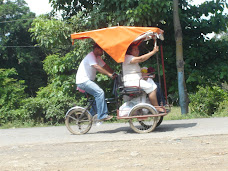
These guys really have to work sometimes.
Cyclo ready for the rain.
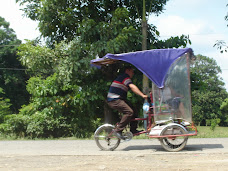
Kind of like Ben Hur, Nica style...

Cart with kids (usually used for hauling much more)
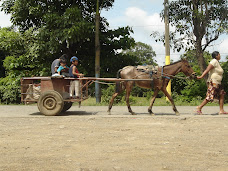
I think there are at least 10 people in there.
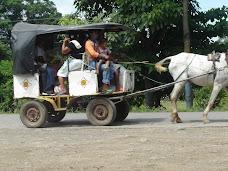
A better angle.
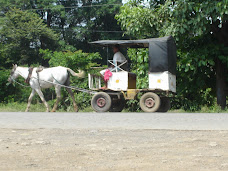
They never looked like this back home...
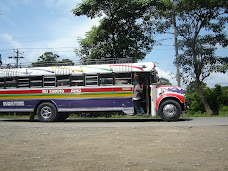
Delivery boy.
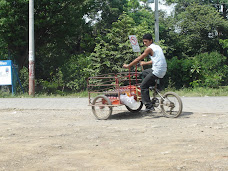
Pat and a local 'puro'.
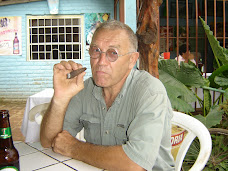
Doesn't he look like a character out of a Graham Greene novel?
The flower market
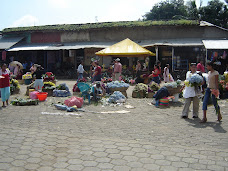
More flowers.
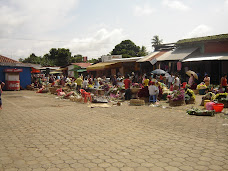
Sorting the platanos.
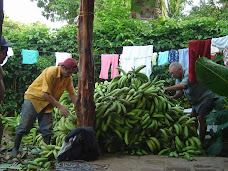
Highest quality are sold in Managua; the rest in Rivas.
Unloading fresh platanos at Edwin's.
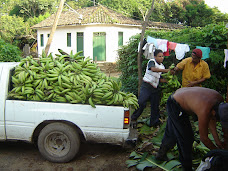
This was the last from this crop. There'll be more in 15 days.
Me, Nicole and Jeysy, daughters of a couple new friends.
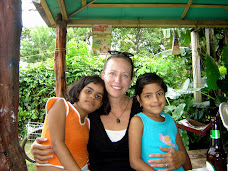
Our jeep and a neighbor's horse at the lake house.
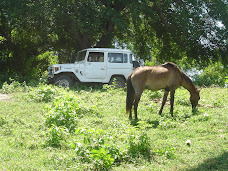
Buenos Aires Marching Band at China's birthday
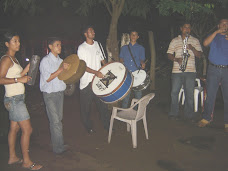
Pat dancing--the bell of the ball at China's bash
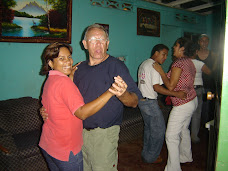
Possibly the world's cockiest rooster
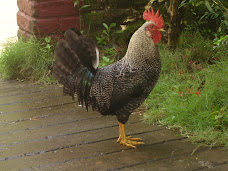
Pun intended...he's not too bright, but has a hell of a crow
Day of Oxtail soup that wasn't...
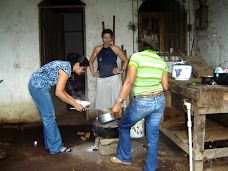
Our hosts overslept and missed the oxtail, so it was just beef.
Leaning pole of power
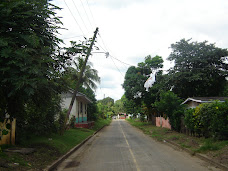
(I just learned another truck has torn it free...)
Our new Beastie
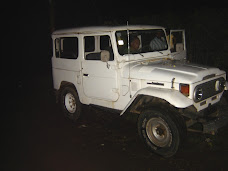
Land Cruiser's cute backside
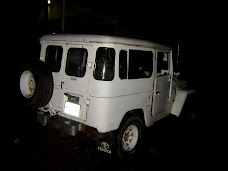
Land Cruiser, me, Rosita, Milagro
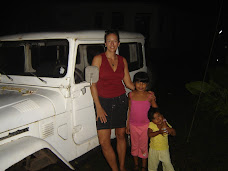
Pat and Milagro, enjoying the view atop the LC
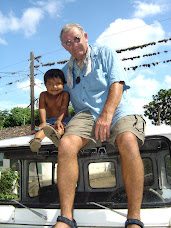
Chepita/Lulu

Pat and the luckiest dog in the world: Dogui
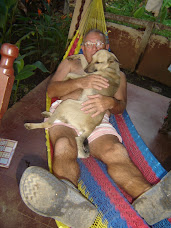
Diablos
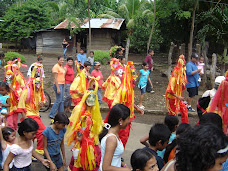
Note Jeysy's house in the background, where Einstein lives.
More Diablos

Guy in center in black is the leader.
And more Diablos
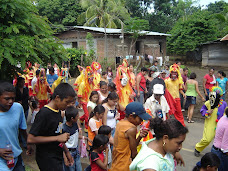
See odd Scary Movie dude up front...
The Man of the Hour: St. Francis
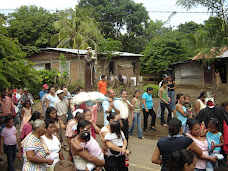
The guy in front is NOT a Gringo, but everyone affectionately calls him "Whitey"
A slice of life for Nica kids
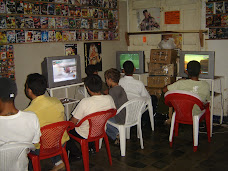
Just a little guy

This one was in the rental, about half the size of the one in the beach house
Packing cigars ("puros"), Granada
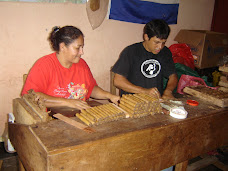
Rolling cigars, Granada
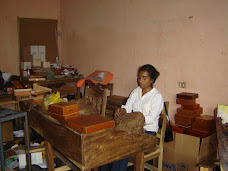
Fresh painting, Granada
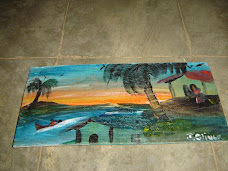
Lake at Granada
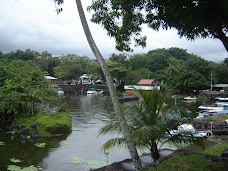
Field of butterflies, Ometepe

Water bus unloading, Cardenas
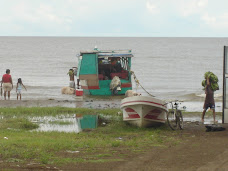
Happy pigs, waiting for the bus
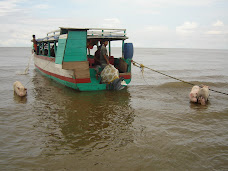
Loading pigs in Cardenas
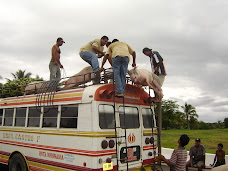
Pat and the Bull, Ometepe
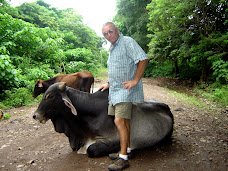
Amelia's house in Matagalpa
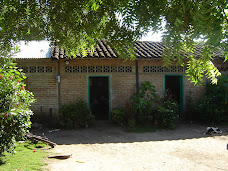
Rosita, Milagro, and 2 cousins, Matagalpa
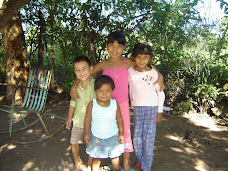
The gang at the Matagalpa bar
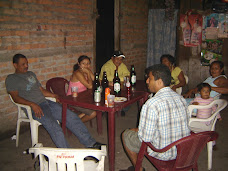
Local boys on ancient jukebox
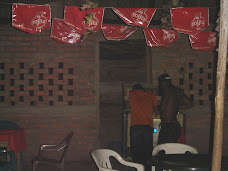
Chapel at Selva Negra
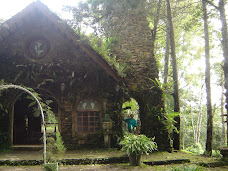
Wedding Chapel, rear, Selva Negra
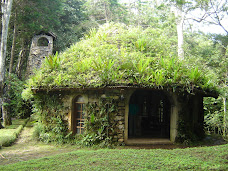
Wedding chapel inside, Selva Negra
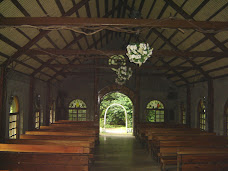
Stone gazebo at Selva Negra
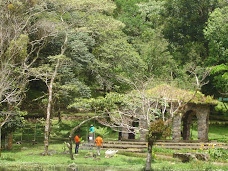
Our resident spider
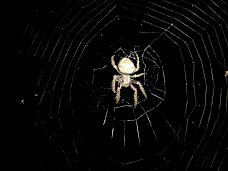
Einstein with flower
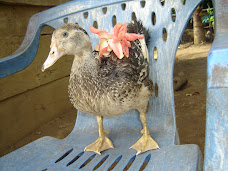
Doña Juana, Jeysy, & Einstein
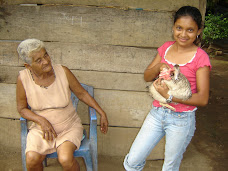
Grant & Linda at Laguna Apoyo
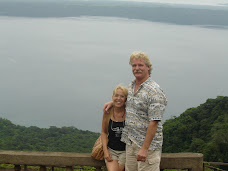
Pat milking Walter's cow
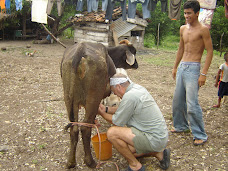
Reyna & kids at local pool
